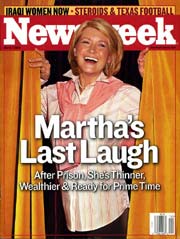Mar 7, 2005. - Newsweek
Playing the Class Card
BY ANDREW MURR
IN THE JURY BOX
There are no black jurors,
but the Jackson trial may hinge on something other than race. And
we don't mean the evidence.
 We all know that the American justice system entitles the accused
to a jury of his peers. But, as Beverly Hills jury consultant Marshall
Hennington says, "What does a group of Michael Jackson's peers
look like?" Not much like the one seated last week in Santa
Maria, Calif.—and that may be good news or bad news. For
either side. The accuser is Hispanic, and a white district attorney
will prosecute Jackson before a jury with no blacks. But Hennington
(who happens to be black) says that's not the real point. "This
is not a case of race," he says, "as much as it is a
case involving child molestation—and the issue of class." We all know that the American justice system entitles the accused
to a jury of his peers. But, as Beverly Hills jury consultant Marshall
Hennington says, "What does a group of Michael Jackson's peers
look like?" Not much like the one seated last week in Santa
Maria, Calif.—and that may be good news or bad news. For
either side. The accuser is Hispanic, and a white district attorney
will prosecute Jackson before a jury with no blacks. But Hennington
(who happens to be black) says that's not the real point. "This
is not a case of race," he says, "as much as it is a
case involving child molestation—and the issue of class."
The jury that will decide whether Jackson molested a 13-year-old
boy after plying him with alcohol consists of seven Anglos, three
Latinos, one Asian and one person whose ethnicity was unclear as
of late last week. (Santa Barbara County is only 2 percent African-American.)
Perhaps more important, they're mostly middle-class folks, and
they may see Jackson as a remote, impossibly wealthy celebrity
who considers himself above the law. Jackson bought his way out
of a previous child-abuse allegation, paying
a multimillion-dollar settlement to a 13-year-old Los Angeles boy
in 1993. (Judge Rodney Melville has yet to decide whether evidence
from that civil suit will be admitted in this criminal case.)
And, as happened in the Martha Stewart trial, jurors may be put
off by a parade of celebrity character witnesses. (This could also
backfire in another way: a 62-year-old juror, confronted with a
list of potential witnesses, thought Deepak Chopra was a rapper.)
On the other hand, jurors may see the accuser and his family as
lowlife con artists. Jackson's lawyers are calling the accuser's
36-year-old mother "a professional plaintiff," and they've
brought up a 1999 civil suit in which the family got a $150,000
settlement from JC Penney and Tower Records after mall security
guards allegedly roughed them up. (The guards claimed the family
shoplifted, though no one was prosecuted.) "What if the boy
lied in the past to help his mother obtain money through the legal
process?" one Jackson attorney
has asked in court. (In grand-jury testimony from the current case-leaked
to thesmokinggun.com— the mother denies ever coaching her
children to lie.) And certainly jurors will be asking themselves
what kind of a mother would let her kid have a sleep over at Michael
Jackson's house.
Even the family's heart-rending string of disasters could ultimately
work against them with jurors who hold such secure and respectable
jobs as engineer and government supervisor. "It's hard to
put yourself in the shoes of people who are having a medical crisis,
a financial crisis and an emotional crisis," says Loyola Law
School professor Laurie Levenson, a former federal prosecutor. "We
don't particularly identify with those people." During the
nasty 2001 divorce, the father admitted beating the mother and
children. That has no relevance to Jackson's guilt or innocence,
but it may not sit well with jurors. As USC law professor Jean
Rosenbluth puts it, "This is not the wholesome all-American
family."
But even if the defense can dehumanize Jackson's accusers, its
bigger challenge will be to humanize Jackson, with his surgically
sculpted mask of a face, his Neverland Ranch, his Peter Pan lifestyle—and
the tens of millions of dollars it takes to sustain it all. The
actual evidence could make these questions of class a moot point,
but don't bet on it.
Return to Top
Return to In the News
|



 We all know that the American justice system entitles the accused
to a jury of his peers. But, as Beverly Hills jury consultant Marshall
Hennington says, "What does a group of Michael Jackson's peers
look like?" Not much like the one seated last week in Santa
Maria, Calif.—and that may be good news or bad news. For
either side. The accuser is Hispanic, and a white district attorney
will prosecute Jackson before a jury with no blacks. But Hennington
(who happens to be black) says that's not the real point. "This
is not a case of race," he says, "as much as it is a
case involving child molestation—and the issue of class."
We all know that the American justice system entitles the accused
to a jury of his peers. But, as Beverly Hills jury consultant Marshall
Hennington says, "What does a group of Michael Jackson's peers
look like?" Not much like the one seated last week in Santa
Maria, Calif.—and that may be good news or bad news. For
either side. The accuser is Hispanic, and a white district attorney
will prosecute Jackson before a jury with no blacks. But Hennington
(who happens to be black) says that's not the real point. "This
is not a case of race," he says, "as much as it is a
case involving child molestation—and the issue of class."